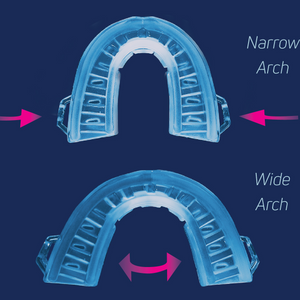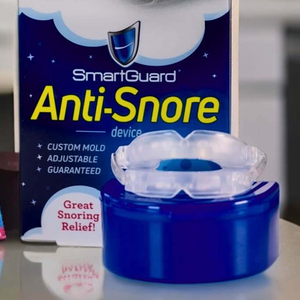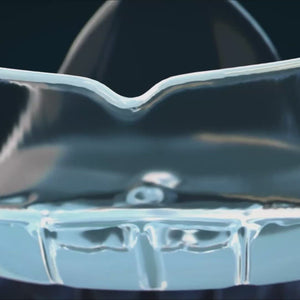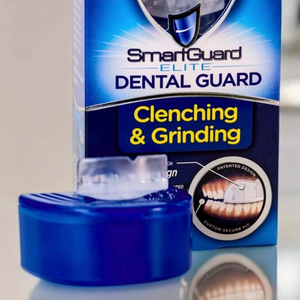May 20, 2023
Are Snoring and Sleep Apnea Linked to Tmj Disorder?
Are Snoring and Sleep Apnea Linked to Tmj Disorder?
You might be surprised to learn that snoring and sleep apnea are sometimes linked to TMJ (Temporomandibular Joint) problems. Your TMJ is the joint where your jaw and skull connect. It enables you to bite and chew, but sometimes the joints experience clicking, popping, or pain when opening or closing your mouth. A series of muscles work the TMJ joint, and these muscles can become tight or inflamed and even contract abnormally. Many people who clench or grind their teeth in their sleep will feel soreness during the day, headaches, or trouble eating normally. These are signs of TMJ disorder. If you are also experiencing fatigue during the day, you may be suffering from both TMJ disorder and sleep apnea, which deprives you of the best kind of sleep. This article addresses the link between snoring, sleep apnea and TMJ disorder.
Obstructive Sleep Apnea (Osa) Often Accompanies Snoring
While snoring is a sign that the sleeper is struggling for free flow of air in breathing, sleep apnea adds the burden of repeatedly stopping and suddenly resuming breathing while asleep. The person with sleep apnea can pause for ten seconds or more without breathing, then suddenly snort, gasp, and snore when finally taking a breath. The body can’t go long without breathing, so it will eventually jolt the sleeper to take a breath. The problem is that as this continues during sleep, the body is not getting a healthy amount of oxygen; and this can cause many health problems to heart, brain, the body’s tissues, and yes, to the jaw joint—TMJ.
Tmd can cause sleep apnea, and sleep apnea can cause tmd
As the body tries to breathe more freely during sleep, it may place the jaw and tongue forward, in an effort to open wider the airway at the back of mouth and throat. This awkward position puts strain on the muscles of the temporomandibular joint and the joint itself. About 45% of people with TMJ disorder also have trouble sleeping, namely because of snoring or sleep apnea. TMJ disorder puts the mouth in an awkward position, thereby increasing the likelihood of obstruction of airflow. Also, a collapsed palate, throat, and obstructive tongue can cause both sleep apnea and TMJ disorder because of the body’s attempt to compensate. Sometimes it’s the “chicken and egg” conundrum. TMJ disorder can cause sleep apnea, and sleep apnea can cause TMJ disorder.
Lack of oxygen to jaw muscles can cause sleep apnea
Another authoritative perspective is taught by a renowned TMJ dentist. He explains that aberrant firing (abnormal contractions) of jaw muscles, such as masseters and pterygoids, can lead to bruxism—clenching and grinding of teeth while asleep—which can obstruct breathing pathways, thereby exacerbating sleep apnea and a reduction of oxygen to the body’s tissues. When the jaw muscles receive less oxygenated blood, it worsens their function. Indeed, a lack of oxygen to the jaw muscles is one of the causes of sleep apnea. This is a “vicious cycle” of actions that cause health problems.
Jaw muscles that fire abnormally May benefit from a snore stopper
To be sure, it’s important to understand the causes of both TMJ disorder and sleep apnea. Think of a car whose front-end alignment is off. A tie-rod on either side of the suspension can pull like a dysfunctional muscle, and straight and smooth rolling of the car is replaced with tension on mechanical joints and uneven wear and tear of tires. Of course, in the case of a car, air-flow is not restricted; however, in the case of a human being, breathing and energy output are adversely affected, leading to sleep deprivation and its many symptoms. Once breathing is restored by CPAP or a good anti-snoring device, blood oxygen rises to give muscles more normal function. What’s more, better sleep helps to restore a person to greater energy in waking hours and a stronger immune system.
OTC anti-snore device can relieve bruxism and snoring
TMJ disorder has many causes: genetics, arthritis, jaw injury, snoring, sleep apnea, emotional stress, and bruxism. Bruxism is the clenching and grinding of teeth during sleep and is a very common cause of TMJ disorder, especially when it has continued for months or years. The jaw muscles become inflamed and don’t work in healthy fashion, not to mention the potential damage to teeth. The good news is that a snore guard fit to your mouth can help.
Sleep apnea also has a variety of causes: weight gain, thick or retracted tongue, having a thick neck, heredity, smoking or drinking alcohol, having a narrow airway, being older, and being male are risk factors. Because obesity is the most common cause, we would do well to avoid or remedy this. It is one of the few causes over which many people have control. Heredity, being male, older, and anatomy of mouth, throat and tongue are set.
The main take-aways are these:
- TMJ disorder and OSA are indeed linked; preventing either one bodes well for preventing the other.
- Decreased blood oxygen is harmful to the body’s brain, organs, muscles, and other tissues.
- A good anti-snore mouthpiece can help to prevent or remedy both OSA and TMJ disorder.







